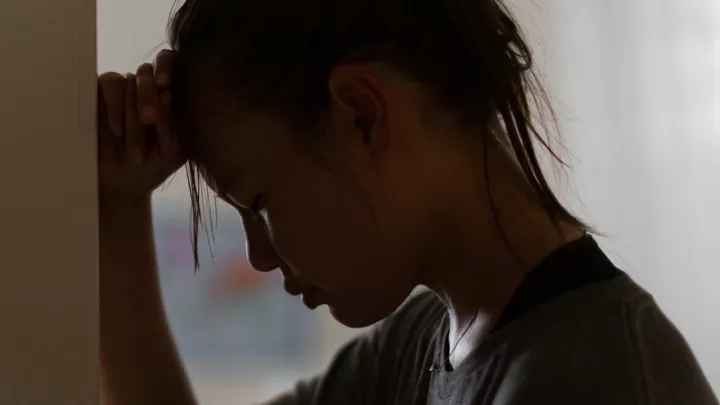What clinical depression feels like and how TMS may help

What is clinical depression?
Clinical depression is one of the most common mental health disorders in the United States. The National Institute of Mental Health (reports that, in 2020, an estimated 8.4% of all adults (21.0 million) in the United States experienced at least one major depressive episode.
Depression simply means a lowering of mood or spirit. Most of us experience mood swings and low moods from time to time. Clinical depression differs from routine mood swings in intensity, duration and impact on life. For some, major depression can result in severe impairments that interfere with our ability to carry out typical life activities.
How does clinical depression feel?
“Everyone’s experience of depression is different and unique to them,” explains psychiatrist Varun Sharma, MD, FAPA, FASAM. “No two people experience depression and the daily life challenges associated with it in the same way.”
Some people have described their depression as feeling like:
- Joy has left my life
- I’m stuck in heavy molasses, and it’s difficult even to move
- I’m not able to take care of my family because I lack motivation or energy
- I’m drowning with a weight tied to my feet
- I’m lonely even when surrounded by people
- Getting up and ready in the morning is a chore, and I’m tired afterward
- I’m a failure even though I’m doing well at work, home or school
- There’s a heaviness on my shoulders that I can’t get rid of
- I have to put on a mask and fake being happy when I’d rather just disappear
- The sun never shines on me because I’m living in the shadow of my depression
How is clinical depression diagnosed?
The Diagnostic and Statistical Manual of Mental Disorders (DSM-5) defines depression as “a period of at least two weeks when a person experienced a depressed mood or loss of interest or pleasure in daily activities and had a majority of specified symptoms, such as problems with sleep, eating, energy, concentration or self-worth.”
- A person with depression may experience symptoms such as:
- Persistent sad, anxious or “empty” mood
- Feelings of hopelessness or pessimism
- Feelings of irritability, frustration or restlessness
- Feelings of guilt, worthlessness or helplessness
- Loss of interest or pleasure in hobbies and activities
- Decreased energy, fatigue or feeling "slowed down"
- Difficulty concentrating, remembering or making decisions
- Difficulty sleeping, early morning awakening or oversleeping
- Changes in appetite or unplanned weight changes
- Thoughts of death or suicide, or suicide attempts
- Aches or pains, headaches, cramps or digestive problems without a clear physical cause that do not ease even with treatment
- Suicide attempts or thoughts of death or suicide
“If someone is experiencing some of these signs and symptoms most of the day, nearly every day, for at least two weeks, they may be suffering from depression,” explains Dr. Sharma. “Not everyone who is depressed will experience every symptom. Some people experience only a few symptoms while others may experience many.”
Several persistent symptoms, in addition to consistent low mood, are required for a diagnosis of major depression. However, people with only a few – but distressing – symptoms may also benefit from treatment. “The severity and frequency of symptoms and how long they last will vary depending on the individual and their particular illness,” says Dr. Sharma. “Symptoms may also vary depending on the stage of the illness.”
What treatments are available for clinical depression?
“Depression is one of the most common mental health conditions. Unfortunately, options for its treatment are often limited,” explains Dr. Sharma. “At Nebraska Medicine, we believe in serious medicine and extraordinary care. With that in mind, the Department of Psychiatry felt a strong need for a comprehensive evaluation and treatment hub to provide the latest evidence-based care for depression.”
Advances in research and technology have created more options for depression treatment. One example is neuromodulation, a technology that acts directly upon nerves. Neuromodulation makes it possible to alter – or modulate – nerve activity by delivering electrical or pharmaceutical agents directly to a target area.
“Traditionally, a psychiatrist would provide medications to help with mental health issues,” says Dr. Sharma. “Now, we can also use neuromodulation to achieve faster, more robust remission of depression while keeping side effects to the minimum.”
What is transcranial magnetic stimulation?
In October 2022, Nebraska Medicine added transcranial magnetic stimulation, or TMS, to its ongoing esketamine and electroconvulsive therapy procedures to provide more options for patients. “TMS is a breakthrough treatment for those with chronic, medication-resistant depression,” says Dr. Sharma. “It uses a strong electromagnet to send magnetic impulses to your brain. This resynchronizes and resets the brain, which improves symptoms of depression.”
How effective is TMS for treating depression?
According to Dr. Sharma, 60% of patients who haven’t found relief even after trying two or more antidepressant medications, see an improvement in their symptoms with TMS. Recent studies also suggest that in most patients, the clinical benefits of TMS last through 12 months.
Where can I find treatment for my depression?
Nebraska Medicine experts provide a wide array of mental health treatments and services, including connecting you to behavioral health resources at no cost. In 2021, Nebraska Medicine opened adult Psychiatric Emergency Services to provide immediate care by licensed mental health providers in a safe, private setting.
To make an appointment with a mental health specialist, call 800.922.0000.






